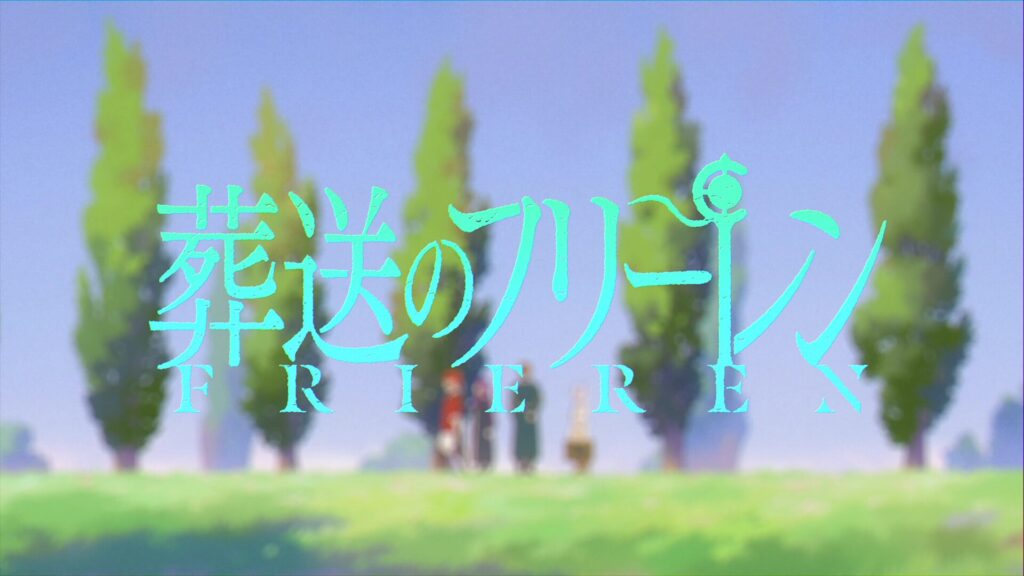
🟦 あらすじ:魔法と人格が交差する一級試験の裏側
The first-class mage exam continues /
一級魔法使い試験が続く中、
as test-takers face off /
受験者たちは対峙する
in increasingly tense duels.
ますます緊迫した対人戦で。
Each battle reveals /
それぞれの戦いが明かすのは
not just magical skill /
魔法の技術だけでなく
but also deep aspects /
さらには深い側面
of personality and past trauma.
人格や過去の傷までも。
Wirbel’s brutal combat style /
ビアベルの容赦ない戦闘スタイルは
stuns even seasoned mages,
熟練の魔法使いさえも驚かせる。
while Ubel’s icy demeanor /
一方でユーベルの冷静な態度は
conceals sharp tactical insight.
鋭い戦術眼を隠している。
Some battles end in defeat, /
ある戦いは敗北に終わり、
others in unexpected mercy.
またある戦いは思いがけない慈悲に終わる。
As the deadline nears, /
締め切りが近づくにつれて、
alliances are tested, /
協力関係が試され、
and the true meaning of strength /
そして本当の強さの意味が
comes into focus.
明らかになっていく。
🗣️ 語彙解説
saturation attack /ˌsætʃəˈreɪʃən əˈtæk/(名詞):飽和攻撃
→ 無数の攻撃を一度に仕掛ける戦術。防御を圧倒する目的で使われる。
binding spell /ˈbaɪndɪŋ spel/(名詞):拘束魔法
→ 相手の動きを封じる魔法。戦闘や捕縛時に多用される。
hesitate /ˈhezɪteɪt/(動詞):ためらう
→ 決断や行動を一瞬遅らせる心理状態を表す。
privilege /ˈprɪvəlɪdʒ/(名詞):特権
→ 特定の立場の人が持つ特別な権利や恩恵。ここでは一級魔法使いの権利。
humanity /hjuːˈmænəti/(名詞):人間性、人類
→ 人らしさや思いやりの心。または人間という種全体を指すこともある。
grimoire /ˈɡrɪmwɑːr/(名詞):魔道書
→ 魔法が記された書物。伝説的な知識の象徴とされることもある。
セリフ #1 – 視線が鍵となる拘束魔法
俺の魔法は、目に収めた奴の動きを封じる魔法だ俺がお前から目を逸らさない限り、お前は動けないその状態のお前なら簡単に殺すことができるしかもこいつ手加減していたな本当に殺すつもりなら、あの奇襲段階で動きを封じていたはずだ
If I can see you, my binding spell can tie you down right where I want you.
As long as I never let my eyes wander away, you are my prisoner.
And a prisoner in the perfect position for execution, by the looks of it.
Yet he hasn’t killed me. And he didn’t kill me then.
If he’d truly intended to take me out, he would’ve bound me during his initial ambush.
🗣️ 語彙解説
binding /ˈbaɪndɪŋ/(形容詞):拘束する、縛る
→ 「bind(縛る)」の形容詞形で、「拘束する力を持つ」魔法などに使われます。
wander /ˈwɒndər/(動詞):さまよう、目を逸らす
→ ここでは「視線が逸れる」という意味で比喩的に使われています。
prisoner /ˈprɪzənər/(名詞):囚人、捕らわれた者
→ 物理的に拘束された人の他、状況に縛られた人も指せます。
execution /ˌeksɪˈkjuːʃən/(名詞):処刑、死刑執行
→ 魔法バトルでは「殺すこと」「とどめを刺す」意味として頻出。
ambush /ˈæmbʊʃ/(名詞/動詞):奇襲、待ち伏せ(する)
→ 敵を不意打ちする戦術やその状況を表す単語です。
take out /teɪk aʊt/(句動詞):倒す、殺す
→ スラング的に「敵を倒す」「排除する」ニュアンスで使われます。
📘 文法・構文・訳しにくい点の解説
If I can see you, my binding spell can tie you down
→ 条件を示すif節と主節の構造。「見えていれば拘束できる」という前提。
right where I want you
→ 関係副詞whereの強調表現。「自分が望むまさにその位置に」という意味。
As long as I never let my eyes wander away, you are my prisoner.
→ 「as long as」は条件を示す接続詞。「〜する限り」という継続条件を表します。
by the looks of it
→ 「見た感じでは」という口語的な表現。状況判断の根拠を示す慣用句。
he would’ve bound me during his initial ambush
→ 仮定法過去完了。「もし本気だったなら〜していただろう」という反実仮想。
📗 スラッシュリーディング訳
If I can see you, /
私に見えているなら
my binding spell can tie you down /
私の拘束魔法で動きを封じられる
right where I want you.
私が望むまさにその場所に
As long as I never let my eyes wander away, /
私が視線を逸らさない限り
you are my prisoner.
お前は囚われの身だ
And a prisoner /
そして囚人だ
in the perfect position for execution, /
処刑に最適な位置にいる
by the looks of it.
見たところでは
Yet he hasn’t killed me. /
それでも奴は私を殺していない
And he didn’t kill me then.
あのときも殺さなかった
If he’d truly intended to take me out, /
本当に殺すつもりだったなら
he would’ve bound me /
奴は私を縛っていたはずだ
during his initial ambush.
あの最初の奇襲のときに
セリフ #2 – 人間性を捨てきれない兵士
そっか時間稼ぎに乗ったのもそのためか驚いたよ、とうに両手は血で染まっているのに、まだ人間でありたいと思っているんだそうだこれは殺す覚悟のための時間だでもな嬢ちゃん、俺はためらい臆することはあっても必要な殺しは全部やってきたぜ
I bought time. Your distaste for murder explains why you let me.
How interesting. Your hands are as drenched in blood as they could be, yet at the end of the day, you want to remain human.
You nailed me. I use this time to prepare myself to kill.
But you should know. Though I may hesitate before finishing the job, I always kill when it’s necessary.
🗣️ 語彙解説
distaste /dɪsˈteɪst/(名詞):嫌悪、嫌気
→ 「〜に嫌な感情を持つこと」で、「殺し」に対する感情として使われています。
drenched /drentʃt/(形容詞):びしょ濡れの、染まった
→ 「be drenched in blood」は「血まみれになる」の定番表現です。
remain /rɪˈmeɪn/(動詞):〜のままでいる、〜であり続ける
→ 「remain human」で「人間性を保つ」「人間であり続けたい」という意味になります。
nail /neɪl/(動詞):的を射る、見抜く
→ ここでは「you nailed me」で「図星だ」「見抜かれた」という意味です。
hesitate /ˈhezɪteɪt/(動詞):ためらう
→ 決断をためらったり、殺しを実行する前の逡巡を表しています。
necessary /ˈnesəˌsɛri/(形容詞):必要な、不可欠な
→ 「when it’s necessary」で「それが必要なときには」という判断基準の表現です。
📘 文法・構文・訳しにくい点の解説
I bought time.
→ 「時間を稼いだ」の定番表現で、「buy time」で意図的に時間を確保すること。
Your distaste for murder explains why you let me.
→ explainの目的語が「why以下」の名詞節。「〜な理由を説明する」という構造。
Your hands are as drenched in blood as they could be
→ 「as A as B」の最上級的構文で「ありうる限り血に染まっている」という強調。
yet at the end of the day, you want to remain human.
→ 「yet」は逆説、「at the end of the day」は「結局のところ」の意味。
Though I may hesitate before finishing the job
→ 「though」は譲歩の接続詞、「may hesitate」は仮定を込めたためらいの表現。
📗 スラッシュリーディング訳
I bought time. /
私は時間を稼いだ。
Your distaste for murder /
君の殺しへの嫌悪が、
explains why you let me. /
私を見逃した理由なんだろ。
Your hands are as drenched in blood /
君の手は血にまみれているほどに、
as they could be, /
これ以上ないほどに。
yet at the end of the day, /
それでも結局、
you want to remain human. /
人間でいたいと思ってるんだ。
You nailed me. /
図星だよ。
I use this time /
俺はこの時間を使っている、
to prepare myself to kill. /
殺す覚悟を固めるためにな。
Though I may hesitate /
俺はためらったり臆病になることはあるが、
before finishing the job, /
とどめを刺す前に、
I always kill when it’s necessary. /
必要とあらば必ず殺してきた。
セリフ #3 – 鳥を捕まえたのは偶然
運が良かっただけだよ偶然シュティレの寝蔵を見つけて、その子は鳥を捕まえる魔法を師匠から教わっていたあんたは何でも捕まえられるのによっぽど運が悪かったみたいだね
I would call it a lucky break.
She’d learned a spell that catches birds from her master, and we just so happened to stumble upon a Stille’s roost early in the exam.
Though, I guess you have a binding spell, too. Luck can’t be on all of our sides, can she?
🗣️ 語彙解説
lucky break /ˈlʌki breɪk/(名詞句):幸運な出来事
→ 偶然のラッキーな展開やチャンスを意味する口語表現です。
stumble upon /ˈstʌmbəl əˈpɒn/(句動詞):偶然出くわす、見つける
→ 意図せず「偶然〜を発見する」時によく使われる表現です。
roost /ruːst/(名詞):鳥の寝ぐら、止まり木
→ 鳥が夜に休む場所で、魔物や生物の「住処」のように比喩的にも使われます。
binding /ˈbaɪndɪŋ/(形容詞):拘束する
→ 前回も登場した語で、動きを封じる魔法を表します。
on one’s side /ɒn wʌnz saɪd/(熟語):味方である、有利に働く
→ 「Luck is on your side」で「運が味方している」という表現になります。
can she? /kæn ʃi/(付加疑問):〜でしょ?(否定の確認)
→ 「Luck can’t be on all of our sides」のあとに続く付加疑問で、相手の同意を求めています。
📘 文法・構文・訳しにくい点の解説
I would call it a lucky break.
→ 「I would call it ~」は仮定の丁寧表現。「それを幸運な出来事と呼ぶかな」という婉曲な言い回し。
She’d learned a spell that catches birds from her master
→ 「She’d」は「had」の短縮で過去完了。「that以下」は関係代名詞でspellを修飾。
we just so happened to stumble upon
→ 「so happen to」は偶然性を強調する熟語で「たまたま~した」。
a Stille’s roost early in the exam
→ 「early in the exam」で「試験の序盤に」。時期を限定する副詞句。
Luck can’t be on all of our sides, can she?
→ 「Luck」は擬人化されて「she」で受けられている。付加疑問は相手の同意確認。
📗 スラッシュリーディング訳
I would call it /
私はそれを〜と呼ぶかな
a lucky break.
幸運な出来事だと
She’d learned a spell /
彼女は魔法を習っていた
that catches birds /
鳥を捕まえる
from her master, /
師匠から
and we just so happened to stumble upon /
そして私たちはたまたま出くわした
a Stille’s roost /
シュティレの寝蔵に
early in the exam.
試験の序盤で
Though, /
でもね
I guess you have /
君も持ってるんだろう
a binding spell, too.
拘束魔法を
Luck can’t be on all of our sides, /
運がみんなに味方するとは限らない
can she?
だろう?
セリフ #4 – 派手な魔法の落とし穴
すごいね、これ鋼鉄に変えた無数の花弁を正確に操って、防御を掻いくぐったでもこれ、我流でしょ我流の人って、基礎がおろそかになっていることが多いんだよね
How impressive.
You transformed flower petals into metallic shards. Quite the feat. They slipped through my defenses.
This is a homemade trick, yes?
It’s very flashy. But spells like that often neglect fundamentals.
🗣️ 語彙解説
impressive /ɪmˈpresɪv/(形容詞):印象的な、すごい
→ 相手の行動や技が「すごい」「目を引く」と感じたときの称賛表現です。
shard /ʃɑːrd/(名詞):破片、鋭いかけら
→ ここでは鋼鉄に変えられた花びらの「鋭い破片」を指しています。
feat /fiːt/(名詞):偉業、すごい技
→ 魔法や剣術などで「よくそんなことができるな」と思うようなワザを称える言葉です。
homemade /ˌhoʊmˈmeɪd/(形容詞):自作の、独自の
→ 「自己流で作った魔法・技」を指し、文脈では「我流の技」というニュアンスです。
flashy /ˈflæʃi/(形容詞):派手な、目立つ
→ 派手で目を引くが、実力や本質とは限らないものを形容します。
neglect /nɪˈɡlekt/(動詞):おろそかにする、無視する
→ 基礎や準備など「重要だけど軽視されがちなもの」を無視する意味があります。
📘 文法・構文・訳しにくい点の解説
How impressive.
→ 感嘆文の省略形。「How + 形容詞」で「なんて〜なんだ」という驚きの表現。
Quite the feat.
→ 「quite the + 名詞」で「かなりの~」「大した~」という強調表現。
They slipped through my defenses.
→ 「slip through」は「すり抜ける」。比喩的に「防御を突破する」という意味。
This is a homemade trick, yes?
→ 文末の「yes?」は口語の確認疑問。「〜でしょ?」という柔らかい確認表現。
spells like that often neglect fundamentals.
→ 一般的傾向を示す現在形。「〜のような魔法は基礎をおろそかにしがち」。
📗 スラッシュリーディング訳
How impressive. /
なんて見事なんだ
You transformed flower petals /
君は花びらを変えた
into metallic shards. /
金属の破片に
Quite the feat. /
大したワザだ
They slipped through my defenses. /
私の防御をすり抜けてきた
This is a homemade trick, yes? /
これ、我流の魔法だろう?
It’s very flashy. /
とても派手だけど
But spells like that /
でもそういう魔法は
often neglect fundamentals.
たいてい基礎がなおざりになる
セリフ #5 – 正面からの無謀な戦い
馬鹿みたいに正面から戦いやがってお前なら勝てねえ勝負じゃなかったはずだだが、一般攻撃魔法だけでこれほどの芸当ができるとしたら、あの女は相当な化け物だな
I didn’t pin you for the type of idiot that attacks head-on.
If you would’ve kept your guard up, then you might’ve had a decent shot.
But if that girl could pull off this stunt with ordinary offensive magic alone, she must be even more of a monster than we realized.
🗣️ 語彙解説
pin (someone) for /pɪn/(句動詞):〜だと思い込む
→ 「I didn’t pin you for 〜」で「君が〜だとは思わなかった」の表現になります。
head-on /ˌhɛdˈɒn/(副詞/形容詞):正面から、真っ向から
→ 「head-on attack」は正面突破の意。「無謀」や「力押し」のニュアンスが含まれます。
keep one’s guard up /ɡɑːrd/(熟語):警戒を怠らない
→ ボクシングなどが語源で「油断しない」「警戒を維持する」ことを意味します。
decent shot /ˈdiːsənt ʃɒt/(名詞句):まともな勝機、チャンス
→ 「勝てる可能性がそこそこある」状況をカジュアルに表現する言い回しです。
pull off /pʊl ɔːf/(句動詞):やってのける、成功させる
→ 困難なことを「うまくやる」「成し遂げる」ときに使う非常に口語的な表現です。
stunt /stʌnt/(名詞):離れ業、妙技
→ 目を引くテクニックや、一風変わった派手な行動に対して使われます。
📘 文法・構文・訳しにくい点の解説
I didn’t pin you for the type of idiot that attacks head-on.
→ 「pin A for B」で「AをBだと思う」。「思わなかった」という否定の意外性を含む構文。
If you would’ve kept your guard up, then you might’ve had a decent shot.
→ 仮定法過去完了の構文。過去の事実と違う仮定を述べている。
you might’ve had a decent shot
→ 「might have + 過去分詞」で「〜だったかもしれない」可能性を表す過去仮定。
pull off this stunt with ordinary offensive magic alone
→ 「with A alone」で「Aだけで」。手段の限定を強調している。
she must be even more of a monster than we realized
→ 「even more of a monster」は「相当な化け物」という強調表現。
📗 スラッシュリーディング訳
I didn’t pin you /
君が〜だとは思わなかった
for the type of idiot /
〜なバカだとは
that attacks head-on.
正面から突っ込むような
If you would’ve kept your guard up, /
もし警戒を維持していたら
then you might’ve had /
君にはあったかもしれない
a decent shot.
勝てるチャンスが
But if that girl /
でももしあの女が
could pull off this stunt /
この芸当をやってのけたのなら
with ordinary offensive magic alone, /
ただの攻撃魔法だけで
she must be even more of a monster /
彼女はさらに化け物じみているに違いない
than we realized.
俺たちの想像以上に


